Diagnostic of Testicular Yolk sac Tumor
Treatment prices are regulated by national law of the corresponding countries, but can also include additional hospital coefficients. In order to receive the individual cost calculation, please send us the request and medical records.

Department of Adult and Pediatric Urology, Andrology
The Department of Adult and Pediatric Urology, Andrology offers the full range of services in the areas of its specialization. Men and boys with diseases of the reproductive system can be diagnosed and treated in the medical facility. Doctors also treat infertility and erectile dysfunction. Medical care is provided to men and women with diseases of the urinary system, namely kidneys, ureters, bladder, and urethra. The department is certified as the Prostate Cancer Center by the German Cancer Society (DKG), which indicates the excellent quality of the services provided in this area. The department's urologists have a perfect command of the innovative treatment methods, including holmium laser enucleation of the prostate (HoLEP), photodynamic therapy, and da Vinci robot-assisted surgery. The department employs comprehensively trained and experienced doctors who apply advanced medical achievements in their practice. Each patient is provided with an individual approach, considering their specific needs and wishes.
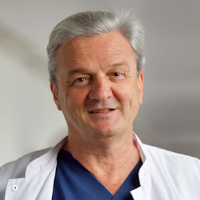





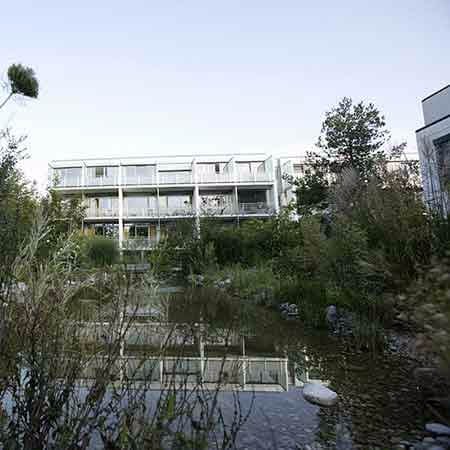
Department of Adult and Pediatric Urology, Andrology
The Department of Urology annually examines more than 480 patients with suspected testicular yolk sac tumor. The doctors carefully examine the epididymis with modern imaging techniques and perform biopsy with a histological test of the material obtained. The department is headed by Prof. Dr. med. Martin Kriegmair, who is a member of the German Society of Urology, as well as of the European and American Association of Urologists.
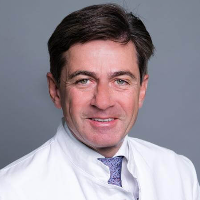
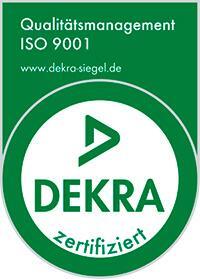

Department of Adult and Pediatric Urology
The Department of Adult and Pediatric Urology provides high-precision diagnostic examinations and effective treatment for diseases of the genitourinary system and reproductive system in men and boys. Of particular interest is drug therapy and surgical treatment of prostate, bladder, kidney, testicular, and penile cancers. The department is part of the Comprehensive Cancer Center Ulm (CCCU). For the patient, this means that their clinical case is studied by a multidisciplinary tumor board, which determines the optimal treatment tactics. The department is also certified by the German Cancer Society (DKG), so all therapeutic procedures meet strict national and international standards. The department's team of urologists also has unique clinical experience in the minimally invasive treatment of kidney stone disease, benign prostatic hyperplasia, neuro-urological dysfunction, and all urologic diseases in children. During the surgical treatment, the specialists at the medical facility successfully use minimally traumatic surgical techniques. They perform endoscopic, laser, minimally invasive, and robot-assisted surgery using the innovative Da Vinci system. The department treats about 3,000 inpatients and 9,000 outpatients with clinical cases of varying complexity annually. The number of surgical procedures performed and treatment outcomes are regularly published by the authorized commission of the Initiative Quality in Medicine (IQM).
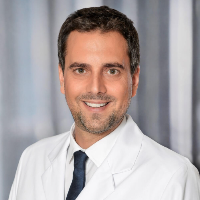





Yolk sac tumors are malignant neoplasms that most often develop in the organs of the reproductive system. They are usually detected in childhood and adolescence, as well as in young people. The disease can be cured if you get medical care at a good hospital. You are welcome to visit the Booking Health website to make your appointment for diagnostics and treatment abroad.
Content
- What is a yolk sac tumor?
- Clinical diagnostics
- Early diagnostics of yolk sac tumors
- Instrumental diagnostics
- Tumor marker blood tests
- Which hospital is it best to visit for testicular cancer diagnostics?
What is a yolk sac tumor?
Yolk sac (endodermal sinus) tumors are malignant germ cell tumors developing from primitive cells. They are similar in their structure to the mesenchyme of the yolk sac.
These neoplasms are found in pure form or as part of mixed germ cell tumors. They produce the alpha-fetoprotein (AFP) tumor marker, which can be determined during the initial diagnostics of the disease, and can be used to assess the effectiveness of treatment and early detection of a relapse after surgical treatment.
Pure yolk sac tumors are the most common in childhood. In adults, these are predominantly a component of mixed neoplasms. A pure yolk tumor is considered to be prognostically favorable. It responds well to treatment and rarely recurs. Metastases are very rare. The best prognosis is noted in the age group up to 3 years.
A yolk sac tumor can have any localization. It usually affects testicles in men and ovaries in women, but there are also extragonadal (outside the reproductive system) neoplasms.
Yolk sac tumors in adult men are usually associated with other types of testicular cancer such as teratoma, seminoma, choriocarcinoma, or fetal carcinoma. A pure yolk sac tumor is the most common neoplasm in childhood. The median age at diagnosis is 18 months. Mixed tumors are most often detected in adolescents and young men over the age of 20 years.
Yolk sac tumors rarely affect women's ovaries. They account for up to 15% of all germ cell neoplasms of the ovaries. Ovarian neoplasms are usually diagnosed before the age of 40 years. The average age of detection of a yolk sac tumor in the ovary is 19 years. Moreover, 40% of the neoplasms in the ovaries are found before menarche. As a rule, only one ovary is affected, and the simultaneous development of tumors in two ovaries is less common. In 60% of cases, it is a pure yolk sac tumor, and in 40% of cases, it is a component of a mixed ovarian tumor.
Clinical diagnostics
You can suspect the presence of a neoplasm in the testicle of a man by its symptoms. As a rule, they are the reason for visiting a doctor. This type of tumor, however, does not have any unique symptoms, so the final diagnosis will be established only after a histological examination of tissue samples.
The main symptoms are as follows:
- testicular swelling;
- enlargement of the size of the testicles;
- scrotal pain.
Most of these symptoms are not associated with cancer. They are caused by other testicular diseases, such as epididymitis (inflammation of the epididymis).
Some neoplasms cause signs of hormonal disorders. A yolk sac tumor is not one of them, but it can be a component of a mixed tumor. Its other components are able to produce hormones such as estrogen, testosterone, and human chorionic gonadotropin (hCG), which cause female-type breast enlargement, early puberty in boys, and the development of secondary male sexual characteristics in childhood (facial hair growth, coarsening of the voice, oily skin, and acne).
Symptoms of the advanced stage of the disease with metastasis spread to the lymph nodes and internal organs include the following:
- lower back pain;
- shortness of breath, cough, and chest pain;
- abdominal pain;
- headaches, fatigue, and fever.
Early diagnostics of yolk sac tumors
Both yolk sac tumors and other types of testicular cancer are rare oncological diseases. Their screening is not carried out in any country in the world.
In most cases, diagnosis begins after the onset of symptoms. Nonetheless, the survival rate of patients still remains at a high level as yolk sac tumors are a prognostically favorable type of cancer, and it manifests symptoms at an early stage. At the time of detection of testicular enlargement, many men do not yet have metastases in their retroperitoneal lymph nodes.
For men who want to self-diagnose testicular cancer, there are several options:
- self-examination once every several months: testicular palpation to detect lumps;
- medical check-ups once every year;
- AFP test, which checks a specific tumor marker of yolk sac tumors (at an early stage, this tumor marker can be elevated only in 60% of cases);
- scrotal ultrasound helps to detect any type of cancer at an early stage.
Instrumental diagnostics
Testicular cancer cannot be diagnosed with clinical diagnostic methods. When a tumor is suspected, various medical imaging techniques are used to visualize the lump and establish the clinical stage of the disease, and the exact type of tumor can be determined based on the results of a histological examination. Even earlier, it can be assumed by tumor marker levels.
A testicular ultrasound scan is the main method of primary tumor diagnostics. This is usually the very first examination prescribed for a patient with testicular complaints. An ultrasound scan is sufficient to distinguish cancer from other diseases such as epididymitis, orchitis, hydrocele, or varicocele. Benign tumors usually do not affect the testicles. If a solid tumor is detected, most likely it is cancer. The detection of a neoplasm in the testicle is therefore the reason for surgery to remove it.
A chest X-ray scan can be carried out to search for lung metastases. Pure yolk sac tumors rarely metastasize, especially in children.
A CT scan can be used to search for metastases in the retroperitoneal lymph nodes, liver, lungs, and other organs. This diagnostic test is more accurate than X-ray or ultrasound scans.
An MRI scan can only be used in cases where symptoms of the nervous system develop. This is the best method for imaging the brain and spinal cord. With the help of an MRI scan, doctors can detect metastases in these organs.
A PET (positron emission tomography) scan can be performed if a doctor suspects the presence of metastases (for example, due to very high tumor marker levels) but does not know exactly where they are located. PET scans the entire body. Doctors inject radioactive substances into the body, which accumulate in tumor foci more than in normal tissues due to high metabolism activity. The zones of accumulation of the radiopharmaceutical are then determined with a gamma camera. A PET scan also helps to distinguish scar tissue after surgery or radiation therapy from a cancer recurrence.
Tumor marker blood tests
Doctors do not perform a biopsy for testicular cancer. Tumor marker tests help to suggest the histological type of the tumor. When doctors know what type of tumor they are dealing with, they can better plan further treatment.
The two main tumor markers are AFP and hCG. Patients with a pure yolk sac tumor or in the presence of components of this type of neoplasm have elevated AFP levels in their blood. hCG levels can also be elevated since this tumor marker is produced by other types of cancer that are part of a mixed tumor.
When conducting diagnostics, lactate dehydrogenase (LDH) levels are also determined. This marker is not specific for yolk sac tumors. LDH levels can be elevated in many other cancers, including tumors outside of the testicle. In addition, LDH levels can be elevated in non-oncological pathologies. But LDH levels give a doctor information about the possible presence of metastases. A strong increase in LDH levels in the patient's blood indicates a high probability of metastasis.
After treatment, determining tumor marker levels, primarily AFP, helps to:
- monitor the effectiveness of treatment;
- early detect a tumor recurrence.
AFP levels drop to normal values if the neoplasm is completely removed. Maintaining high AFP levels after surgical treatment indicates a residual tumor or metastases. This is a reason for further diagnostics for a patient, additional treatment with chemotherapy, and for monitoring dynamics with repeated determination of tumor marker levels.
AFP levels can be used not only to assess the effectiveness of surgical treatment. They can be used to judge how well chemotherapy is working. If there is a response to treatment, tumor marker levels decrease. Their elevation helps to timely determine that the treatment is ineffective and not to continue it further. In such situations, doctors at foreign hospitals change a treatment regimen to get better results.
Which hospital is it best to visit for testicular cancer diagnostics?
You can visit one of the foreign hospitals to diagnose a yolk sac tumor or any other type of testicular cancer. Modern hospitals in developed countries use state-of-the-art equipment and employ highly qualified urologists and oncologists. When you opt to have medical care at such hospitals, you can expect accurate diagnostics and successful treatment of oncological diseases.
There are a few reasons for you to undergo your treatment abroad:
- testicular tumors can be diagnosed even at an early stage;
- safe diagnostic methods, including in childhood;
- foreign hospitals give preference to diagnostic procedures that do not impair reproductive function;
- accurate testicular cancer staging allows for ideal treatment planning;
- foreign hospitals have state-of-the-art equipment for accurate diagnostics of oncological diseases;
- doctors at foreign hospitals can assume the histological type of the tumor even before the histological examination of tissue samples, which affects the choice of treatment tactics.
You can get information about hospitals, doctors from foreign hospitals, and the cost of treatment on the Booking Health website. On our website, you can make an appointment for your diagnostics at one of the world's best hospitals and compare the cost of treatment at different hospitals to choose the most suitable option at the best price. The specialists from the Booking Health company will help you to choose a hospital and organize your trip. When making your appointment through the Booking Health service, the cost of treatment will be lower due to the absence of additional fees for foreign patients.
Authors:
The article was edited by medical experts, board-certified doctors Dr. Nadezhda Ivanisova and Dr. Vadim Zhiliuk. For the treatment of the conditions referred to in the article, you must consult a doctor; the information in the article is not intended for self-medication!
Sources:
National Center for Biotechnology

